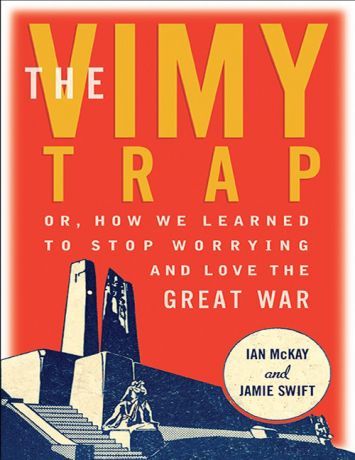Arts
You are here
The Vimy Trap is an anti-war celebration

January 13, 2017
This timely book drops a grenade on the almost sacred notion that the WWI battle at Vimy Ridge was the moment of Canada’s “birth as a nation”.
With the centenary of this event fast approaching – April 9, 2017 – and planning for a nationalistic extravaganza that started under Harper and continues under Trudeau, this is a moment to learn the true history of this battle. Authors Ian MacKay and Jamie Swift deftly undo the myths of “vimyism.”
Slaughter
The facts of the battle are undisputed. On April 9, 1917 the Allies, under British command, including four Canadian battalions, went “over the top” and caused the Germans to retreat at Vimy Ridge in France. The total gain of land: 4,500 yards. The total Canadian casualties: 10,600 including 3,500 dead.
Some Canadian historians and governments have claimed that this was the battle that turned the tide of war. Based on extensive research, McKay and Swift handily debunk this notion by noting that nearly every major historical account of WWI lists Vimy as a minor and inconclusive battle, if it is listed at all.
Moreover, the initial enthusiasm in Canada for involvement in the war in 1914 turned quickly when the horrific slaughter and carnage, squalid conditions of soldiers and inept actions of officers became apparent. To make matters worse, PM Robert Borden reneged on a campaign promise and called for conscription in 1917, sparking riots by Quebecers refusing to be forced to fight for the British.
McKay and Swift describe the events of the aftermath of the war in which many who initially supported it changed their minds. The casualties were so high that nearly every family was affected or knew some one who was. Returning soldiers, many wounded and unable to find work, rioted.
Group of Seven artist Fred Varley returned from the war and produced his most famous painting For What? He said, “We’d be healthier to forget (the war), and that we never can. We are forever tainted with its abortiveness and its cruel drama.”
Canadian veteran Charles Yale Harrison, wrote Generals Die in Bed, that according to the authors “demolished the central theme of war commemoration: the equality of sacrifice in death.” The novel’s scathing indictment of the WWI military elite became an international bestseller.
Even the post-war Prime Minister, William Lyon Mackenzie King, actively monitored the development of the Vimy monument in France to ensure it bore no hint of militarism or any glorification of the battle. Both the artist Walter Allward and King intended it to be a monument to peace.
Vimyism
The whitewash of the real history and glorification of Vimy did not begin until decades after the war. Swift and MacKay’s research tracks the development of “vimyism” beginning in the 1960s in response to Cold War militarism and the build up to Canada’s centenary in 1967. The myth of a martial nationalism is embodied in the slogan “Canada from the Atlantic to the Pacific,” a glorification of the fact that a Quebec unit, the Van Doos, fought with English Canadian regiments at Vimy. But, the authors note that it is hard to imagine “francophone Quebeckers cheering on the enforcers of armed conscription.”
It would be the publication of Pierre Berton’s Vimy in 1986 that would lend the most momentum to vimyism. Berton championed the notion of the “birth of a nation” in this hugely popular work. But, the authors note that his intention was not so much war glorification as the attempt to conjure a unique Canadian character. The valour of Vimy was based on the fanciful notion of the adventurous, frontier spirit of Canadians according to Berton.
Berton’s myth-making about the war and Canadian character have become almost the official history now. Stephen Harper’s Conservatives rode these myths to significantly ramp up martial nationalism to justify expanding militarism. Trudeau has followed in lock step and even upped the ante with new commitments of troop deployments to NATO and arms deals for Saudi Arabia.
This book is an important antidote to the war glorification and triumphalism that will be served up in April.
“Yeah, yeah, Vimy-fucking-ridge, I was there. ‘Birth of a nation’ they called it on TV, but I didn’t see nobody being born, just a lot of people dying…” So says Rosie Rollins, in David Fennario’s Bosheviki: a Dead Serious Comedy. Anglo-Montreal playwright, Fennario, had put out the call for mass readings of his two WWI anti-war plays, Bolsheviki and Motherhouse, on April 9, 2017, to counter the nationalist extravaganza that the Trudeau government is planning for the Vimy centenary.
Help build a massive, noisy protest to challenge the spectacle of war!
• To find out more or to organize a reading in your area please go to: www.vimyridging.weebly.com.
Section:
Topics:









